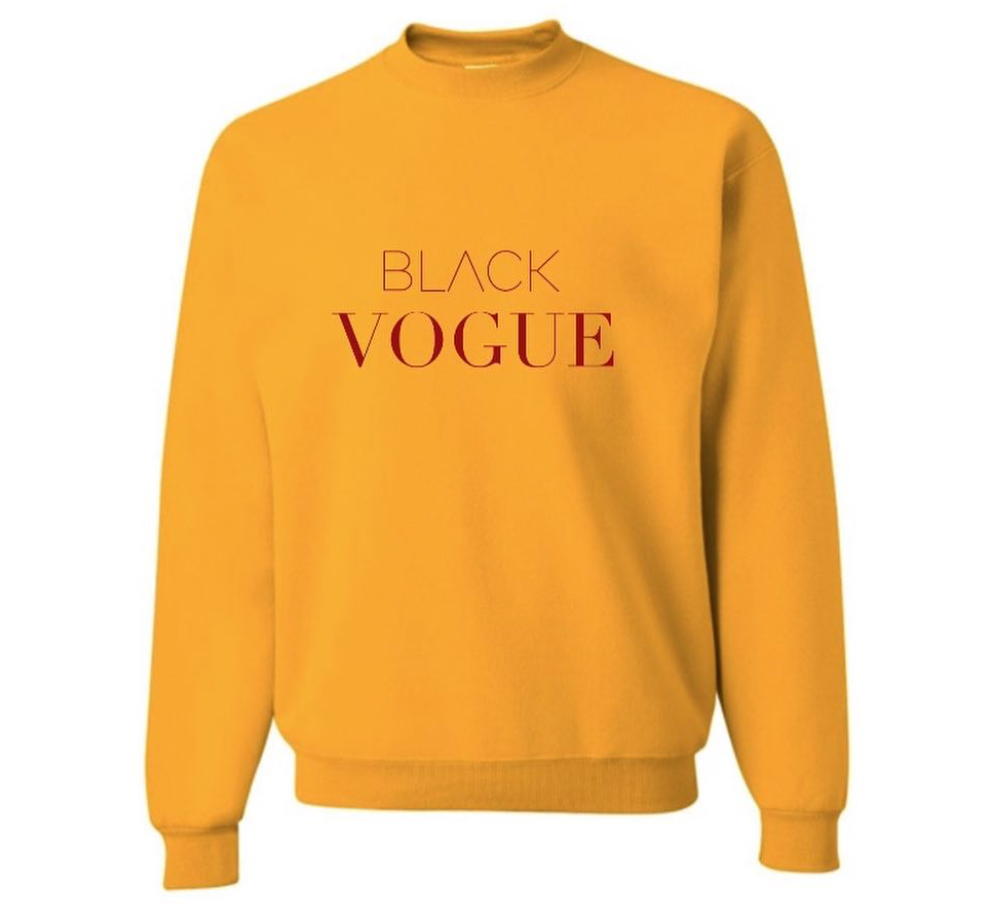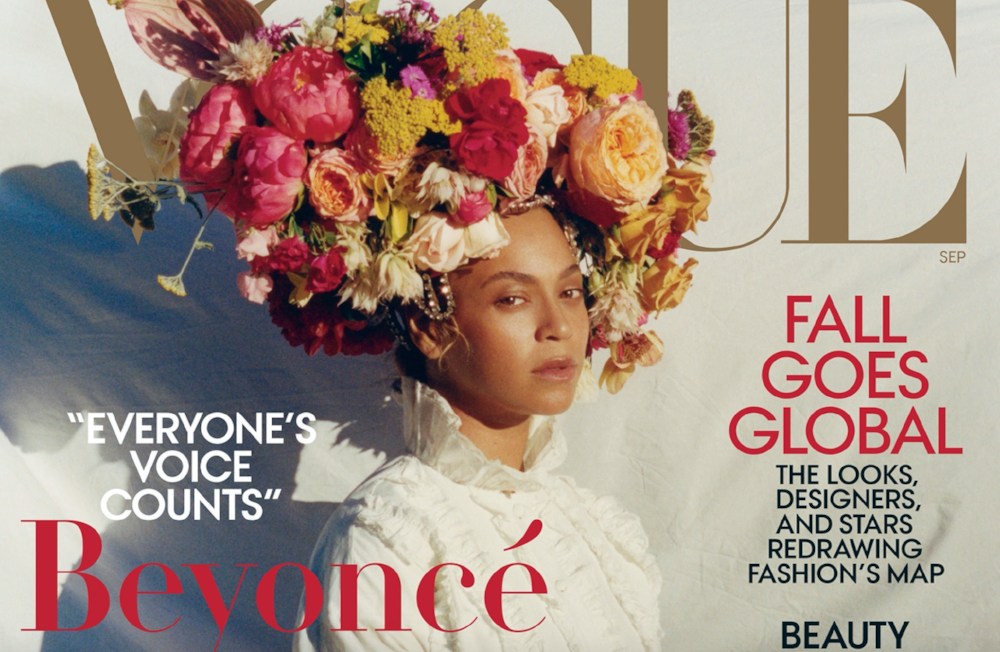Vogue Magazine is taking Black Vogue to court. Advance Publications, Vogue and Condé Nast’s parent company, filed suit against 26-year old designer and activist Nareasha Willis late last week in a New York federal court, alleging that the name of her collection is a bit too similar to the name of its 125-year old marquee magazine and as a result, is likely to cause confusion amongst consumers, and damage to its well-known and “highly acclaimed” Vogue trademarks.
According to Advance’s complaint, while it has been using the federally-protected Vogue trademark for the past 125 years on magazines (as well as on an increasingly “wide variety of goods and services,” including “advertising and e-commerce services, software applications for content in the field of fashion, hand bags, tote bags, purses, luggage, wallets, body creams, scented candles, jigsaw puzzles, nightclub and restaurant services, clothing and jewelry”), Ms. Willis “has very recently begun using the trademark Black Vogue in commerce, for the purposes of selling apparel items.”
Advance asserts that the Black Vogue mark “mirrors the well-known font and stylization of [Advance’s] long registered Vogue trademark” and that “in selecting the trademark Black Vogue for her products, [Willis] intends to create a link between herself and [Vogue], creating the appearance that [Advance] is affiliated with [Willis’] products, or that [Advance] has licensed or otherwise authorized her use of the Vogue trademark, when that that is not the case.”
It turns out, the Black Vogue line first came on Advance’s radar earlier this year after Willis filed a trademark application with the U.S. Patent and Trademark Office (“USPTO”) to register Black Vogue for use on an array of garments and accessories, including hoodies, baseball caps, track pants, trench coats, and swimming trunks. As Advance accurately sets forth in its complaint, “On May 23, 2018, the USPTO refused registration of [Willis’] Black Vogue trademark,” holding that it “is confusingly similar to several of [Advance’s] registered Vogue trademarks.”
“Immediately upon learning of [Willis’] trademark application” in June, Advance alleges that its legal team sent Willis a letter, “requesting that [she] cease her use of the infringing Black Vogue mark and abandon her pending trademark application.”
When Advance’s counsel followed up with Willis, she “indicated that she refused to cease her use of the Black Vogue trademark” and following further correspondences, which “yielded no response from Willis,” Advance says that it was left without recourse and forced to file suit, as Willis’ “use of her Black Vogue mark is highly likely to cause confusion with [its] registered trademarks, which will damage [its] reputation and the goodwill” in the Vogue trademark.
As a result of what Advance calls “willful disregard [for] its longstanding trademark rights in the Vogue trademark” and a “willful attempt [by Willis] to trade upon the goodwill that [it] has developed in its [Vogue] marks over the last 125 years,” Advance is asserting trademark infringement and dilution, and unfair competition claims, and has asked the court to order Willis to immediately and permanently cease all use of the “Black Vogue” trademark and any similar trademarks, domain names, and “advertising keywords or metatags to promote any product.”

Moreover, Advance is seeking monetary damages, including “all gains, profits and advantages derived by [Willis] from her infringement, unfair competition; and dilution of the Vogue mark.”
Interestingly enough, Advance-owned Teen Vogue ran a glowing story on Willis this spring, stating that “at just 25-years-old, Nareasha launched her fashion brand Black Vogue to present an alternative, more inclusive, fashion image.” At the time of the brand’s launch, “Nareasha felt that mainstream platforms were not doing enough to properly highlight the positive contributions of black people in fashion,” an industry that continues to be shrouded in racism – from the runway to the helm of big-name brands.
“My goal when creating my brand Black Vogue and designing apparel has been to communicate many thoughts and facts that we as a community already know and have said to one another in private conversations,” Willis told Teen Vogue in May. The site’s Amira Rasool noted in the article that since one of Willis’ designs – a sweatshirt emblazed with the words, “Ghetto Until Proven Fashionable” – appeared on a Vogue fashion month street style gallery, the “photograph of [stylist] Melody [Trend] quickly went viral on social media and … sparked an important conversation about cultural appropriation and black people’s legacy in fashion.”
According to a statement from Ms. Willis, “I started the Black Vogue movement with one goal in mind: to start a conversation that was long overdue and to shake the fashion industry so that my people, people from the African diaspora, are acknowledged, celebrated and given their deserved respect and recognition. The fashion industry has lacked diversity for years yet it still continues to appropriate black culture via style, dress, hair etc. … I created ‘black vogue’ to address this problem and provide an outlet for black people to celebrate themselves.”
She further states, “I am not the only designer that a major magazine has gone after, nor will I be the last, but I do plan for them to hear me out, hear us out and understand that the word ‘vogue’ is for everyone, especially for the Black Culture. Black Vogue is a movement, a lifestyle! They can try to take the shirts, but you can’t take the movement, we don’t want the brand, we ultimately want to be celebrated and the deserved recognition.”
UPDATED (June 15, 2020): Advance has agreed to voluntarily dismiss its case, albeit with a few conditions. On the heels of the parties reaching a potential settlement late last month, as indicated by a filing on May 26 (one day after the death of George Floyd), Judge Alvin Hellerstein signed off on a Consent Judgment and Order on June 3, which permanently bars Willis and Avenue N, LLC from using “Black Vogue” or “any other confusingly similar mark” from now. The Judgment and Order, which is the product of an agreement between the parties, states that neither Willis nor any individuals or companies acting on her behalf may use any “reproduction or colorable imitation of the ‘Vogue’ mark, including any such use of the word ‘Vogue’ alone or in connection with any other wording, as a hashtag, metatag, advertising keyword, username or domain name on or in connection with any Internet website or social media.”
*The case is Advance Magazine Publishers, Inc. v. Nareasha D. Willis, 1:18-cv-8912 (SDNY).











